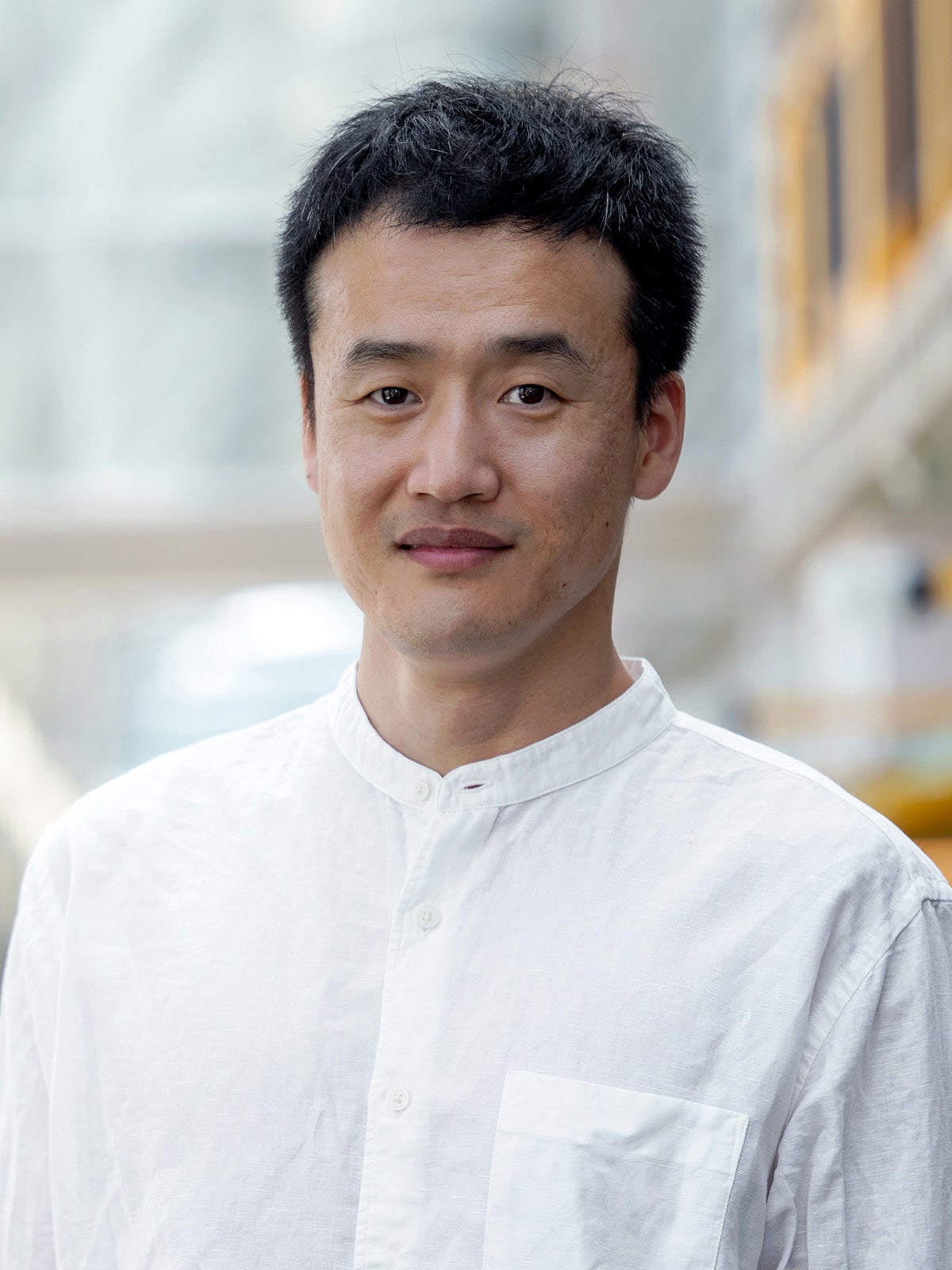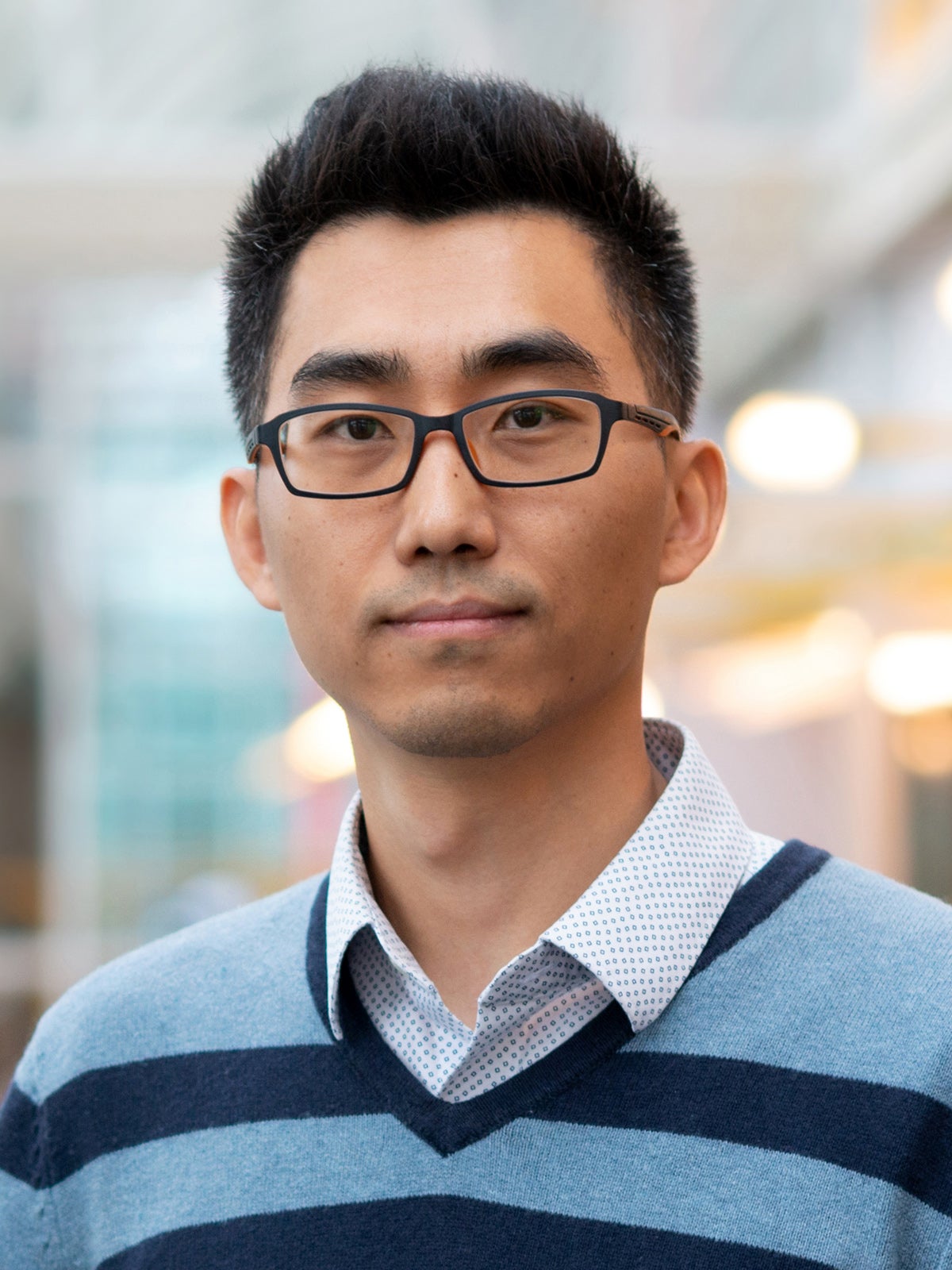The David R. Cheriton Faculty Fellowships are a prestigious recognition. The awards support the work of leading faculty in computer science with an emphasis on supporting research that addresses problems associated with designing and implementing efficient and reliable computing systems, along with their effective integration.
These fellowships help the University of Waterloo and the David R. Cheriton School of Computer Science continue their innovations in information technology teaching and research.
Current Cheriton Faculty Fellows
2025–2028
Chengnian Sun

Chengnian Sun is an Associate Professor at the Cheriton School of Computer Science. His research interests lie at the intersection of software engineering and programming languages, with a focus on improving software quality and enhancing developer productivity through better tools, techniques and methodologies.
He has a PhD in Computer Science from the National University of Singapore. Previously, he worked as a software engineer at Google in Mountain View, California, and as a postdoctoral researcher at the University of California, Davis.
Since joining the Cheriton School of Computer Science in fall 2019, Professor Sun has secured more than $1 million in research funding from government, university and industry programs. His research has received multiple accolades, including the Most Influential Paper Award at SANER 2022 and the Most Influential Paper Award at OOPSLA 2025.
As of October 2025, his research publications have been cited collectively more than 4,800 times, with an h-index of 28, according to Google Scholar.
Jian Zhao

Jian Zhao is an Associate Professor at the Cheriton School of Computer Science and an international leader in the fields of information visualization (InfoVis), human–computer interaction (HCI), and data science, who develops advanced technologies to promote the interplay between humans, AI and data.
He has published more than 100 peer-reviewed papers in top-tier venues across InfoVis, HCI and related fields. His work has received four Best Paper Awards and eight Honourable Mentions. In 2025, he received an Ontario Early Researcher Award.
He has a PhD in Computer Science from the University of Toronto. Since joining the Cheriton School of Computer Science in fall 2019, Professor Zhao has secured more than $1.9 million in research funding from government, university and industry programs, and has established collaborative projects with major enterprise partners, among them Adobe, Meta, Cisco, BlackBerry and Unity. He has trained five postdocs, over 30 PhD/master’s students, and numerous undergrads during his tenure in industry and academia. Professor Zhao also holds over 20 granted patents, and his research has been covered in many media outlines including The Record, CBC News, and CityNews.
As of October 2025, his research publications have been cited collectively more than 3,700 times, with an h-index of 34, according to Google Scholar.
2024–2027
Lila Kari

Lila Kari is Professor in the Cheriton School of Computer Science, where she moved from her previously held position in the Department of Computer Science at the University of Western Ontario (1993-2017). She received her M.Sc. in 1987 from the University of Bucharest, Romania, and her Ph.D. in 1991 for her thesis “On Insertions and Deletions in Formal Languages,” for which she received the Rolf Nevanlinna doctoral thesis award for the best doctoral thesis in mathematics thesis in Finland.
Author of more than 250 peer-reviewed articles, Professor Kari is a recognized expert in the area of biomolecular computation, that is using biological, chemical and other natural systems to perform computations. In 2015, she received the Rozenberg Tulip Award for the DNA Computer Scientist of the Year, awarded at the 21st International Conference on DNA Computing and Molecular Programming, Harvard University, USA, for her contributions in advancing formal theoretical models and exemplary leadership in the field. The award is presented by the International Society for Nanoscale Science, Computation and Engineering, ISNSCE, annually and recognizes a prominent scientist who has shown continuous contributions, pioneering, original contributions, and who has influenced the development of the field.
She is Editor-in-Chief of the journal Theoretical Computer Science-C (theory of natural computing), as well as Editor-in-Chief of the Springer Natural Computing Series. She has served as Steering Committee Chair for the DNA Computing and Molecular Programming conference series, as Steering Committee member for the Unconventional Computation and Natural Computation conference series, as well as on the Scientific Advisory Committee of the International Society for Nanoscale Science, Computation, and Engineering. She serves on the editorial board of the journal Natural Computing and Journal of Universal Computer Science, on the advisory board for the EATCS-Springer series Monographs in Theoretical Computer Science and Texts in Theoretical Computer Science, and was section editor for the Handbook of Natural Computing (Springer Verlag, 2012).
She has additionally served as a member of the Board of Directors of the FIELDS Institute for Research in Mathematical Sciences, the UK EPSRC Peer Review College, on the NSERC Grant Selection Committee on Computing and Information Systems, the NSERC Herzberg-Brockhouse-Polanyi Prize joint selection committee, and NSERC Steacie Memorial Fellowship committee. At the University of Western Ontario she has received several awards, including the Florence Bucke Science Prize, the Faculty of Science Award for Excellence in Undergraduate Teaching, and Canada Research Chair in Biocomputing (2002–2006, and again in 2007–2011). At the University of Waterloo, she received the School of Computer Science Outstanding Performance Award in 2018, and was University Research Chair from 2017 to 2023. Her current research focuses on comparative genomics, biodiversity informatics, as well as theoretical aspects of bioinformation and biocomputation.
Florian Kerschbaum

Florian Kerschbaum is a Professor in the Cheriton School of Computer Science (joined in 2017), a member of the CrySP group, and the NSERC/RBC Research Chair in Data Security since 2019. Previously, he worked as chief research expert at SAP in Karlsruhe (2005–2016) and as a software architect at Arxan Technologies in San Francisco (2002–2004).
He holds a Ph.D. in computer science from the Karlsruhe Institute of Technology (2010) and a master’s degree from Purdue University (2000). Professor Kerschbaum served as the inaugural director of the Waterloo Cybersecurity and Privacy Institute from 2018 to 2021. He is an ACM Distinguished Scientist (2019), a winner of the Outstanding Young Computer Science Researcher Award from CS-Can/Info-Can (2019) and a winner of the Faculty of Math Golden Jubilee Research Excellence Award (2022).
He is interested in security and privacy in the entire data science lifecycle. He extends real-world systems with cryptographic security mechanisms to achieve (some) provable security guarantees. His work is used in several business applications.
2023–2026
Khuzaima Daudjee

Khuzaima Daudjee is a Research Associate Professor at the Cheriton School of Computer Science. He designs and develops systems that store and manage data. His research thrusts are large-scale data management, storage, and provision of systems-level support for applications such as streaming, graph processing and machine learning.
Khuzaima’s work has been recognized with several awards, among them two SIGMOD Best Demonstration Awards (2020 and 2021) and an ACM Symposium on Cloud Computing Best Paper Award. He has served as Associate Editor of PVLDB, SIGMOD, ICDE, IEEE Transactions on Data and Knowledge Engineering, Distributed and Parallel Databases, and Information Systems. In recognition of his outstanding contribution to computer science, Khuzaima has been named an ACM Distinguished Scientist.
Toshiya Hachisuka

Toshiya Hachisuka is an Associate Professor at the Cheriton School of Computer Science, affiliated with three research groups: Computer Graphics, Scientific Computation, and Computational Mathematics.
His research focuses on the numerical and mathematical aspects of light transport simulation for realistic image synthesis. By combining applied mathematics, computer science, and physics, he has been working on various problems related to visual simulation of objects.
Before joining the University of Waterloo in 2020, he worked as an Associate Professor at the University of Tokyo and an Assistant Professor at Aarhus University. He received a PhD from the University of California, San Diego.
Previous Cheriton Faculty Fellows
| Cheriton Faculty Fellows | Year |
|---|---|
| Eric Blais, Semih Salihoğlu | 2022–25 |
| Jesse Hoey, M. Tamer Özsu | 2021–24 |
| Christopher Batty, Yaoliang Yu | 2020–23 |
| Lap Chi Lau, Daniel Vogel | 2019–22 |
| Edward Lank, M. Tamer Özsu | 2018–21 |
| Urs Hengartner, Bernard Wong | 2017–20 |
| Tim Brecht, Charles Clarke | 2016–19 |
| Dan Brown, Pascal Poupart | 2015–18 |
| Michael Godfrey, Jesse Hoey | 2014–17 |
| Ihab Ilyas, M. Tamer Öszu | 2013–16 |
| Raouf Boutaba, Kate Larson | 2012–15 |
| Gladimir Baranoski, Peter Forsyth | 2011–14 |
| Robin Cohen, Alejandro López-Ortiz | 2010–13 |
| Ken Salem, John Watrous | 2009–12 |
| Charles Clarke, Yuying Li | 2008–11 |
| Raouf Boutaba, Frank Tompa | 2007–10 |